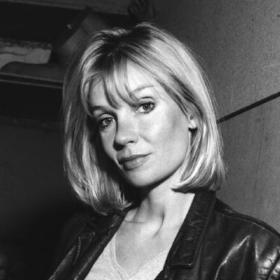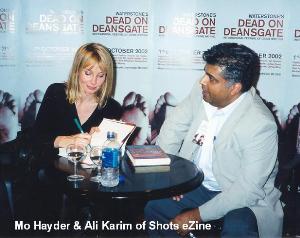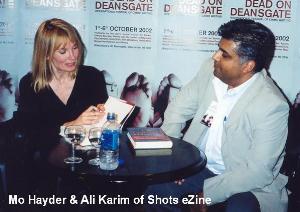Ali: | Welcome to Shots eZine.
|
Mo: | Thanks for asking me.
|
Ali: | After a few yearís wait we see that you have a new book, Tokyo, coming out. Can you tell us what you have been up to since you released The Treatment?
|
Mo: | Having a baby, researching Tokyo. I visited Japan and China to get some background on the book.
|
Ali: | You grew up in an academic household and you also teach. Can you tell us if you enjoy academia?
|
Mo: |
 Iím not sure I do enjoy academia. My father was an academic and I found the environment quite stultifying. I got out of the house (and school) when I was fifteen - maybe that shows you how much I didnít like it. Having said that, it seems quite a natural milieu for me to write about - I quite enjoyed writing the old Chinese professor in Tokyo who has had years working in a subject that he is not interested in (he has ulterior motives for sticking with it). And teaching: well I do teach occasionally on a post grad creative writing course and I do, sometimes, enjoy it. It must be something to do with my being bossy - I quite like telling people what to do.
Iím not sure I do enjoy academia. My father was an academic and I found the environment quite stultifying. I got out of the house (and school) when I was fifteen - maybe that shows you how much I didnít like it. Having said that, it seems quite a natural milieu for me to write about - I quite enjoyed writing the old Chinese professor in Tokyo who has had years working in a subject that he is not interested in (he has ulterior motives for sticking with it). And teaching: well I do teach occasionally on a post grad creative writing course and I do, sometimes, enjoy it. It must be something to do with my being bossy - I quite like telling people what to do.
|
Ali: | I noticed that you were very active in last years Harrogate Crime-Writing Festival. Can you tell us how you got involved and your thoughts about the event?
|
Mo: | I think everyone involved in Harrogate felt that theyíd been in at the start of something big. It was really well organised and exciting - and this year doubly so. Theyíre attracting some really big names this year.
|
Ali: | After finishing The Treatment did you feel pressure to return back to the world of the police procedural?
|
Mo: | Iíve got very sympathetic publishers. Selina Walker and Patrick Janson Smith at Transworld (and many others) were very supportive and let me do my thing. They put a lot of faith in me.
|
Ali: | You told us last time about your time in Japan in the eighties; did you choose the subject material that became Tokyo or did it choose you?
|
Mo: | I chose Tokyo as a place to live, then it chose me as subject matter. Once youíve lived in Tokyo you canít help but want to write about it. It took a little time to figure out exactly what story the setting needed - it had to be something that resonated within the context of Japanese society.
|
Ali: | You travelled to the East to research the backdrop for Tokyo. Would you care to tell us a little about that time?
|
Mo: |
 I went to Japan in the 1980s and taught English. Then I discovered the hostess bars - where I could earn well and also relax. Thatís where I got the idea for the hostess club in Tokyo. When I started writing the book I knew Iíd need to go back to refresh my memory. I was also curious about whether hostesses had changed their attitude since the Lucie Blackman murder, so I went out of my way to track down the club sheíd been working in. This took a lot of time and legwork - the club had changed its name - all I had was an image of the interior of the club from a TV documentary and the name of one of the other clubs in the same building. But find it I did (after three days) and by some stroke of luck, and maybe a happy accident of lighting, the club manager gave me a job as a hostess, generously not noticing that I was pushing 42 when the average age of the other girls was something less than 19. I spent four days there, not telling people what I was doing, chatting to the girls and to the customers, some of whom remembered both Lucie and her killer. I was surprised that the girls hadnít much changed their behaviour - they still were going out drinking with customers after work and doing Ďdohaní (meeting the customers for meals before work so that they could bring them to the club later).
I also went to Nanking three years ago. It was extraordinary to see a new city sitting where the massacre happened (Hiroshima is similarly completely rebuilt - youíd never know anything had happened there). There is a memorial, and Nanking citizens still say they hate the Japanese, but otherwise itís as if it didnít happen. But I met two people who were in Nanking at the time of the massacre, and both their stories made the book move in directions I hadnít anticipated.
I went to Japan in the 1980s and taught English. Then I discovered the hostess bars - where I could earn well and also relax. Thatís where I got the idea for the hostess club in Tokyo. When I started writing the book I knew Iíd need to go back to refresh my memory. I was also curious about whether hostesses had changed their attitude since the Lucie Blackman murder, so I went out of my way to track down the club sheíd been working in. This took a lot of time and legwork - the club had changed its name - all I had was an image of the interior of the club from a TV documentary and the name of one of the other clubs in the same building. But find it I did (after three days) and by some stroke of luck, and maybe a happy accident of lighting, the club manager gave me a job as a hostess, generously not noticing that I was pushing 42 when the average age of the other girls was something less than 19. I spent four days there, not telling people what I was doing, chatting to the girls and to the customers, some of whom remembered both Lucie and her killer. I was surprised that the girls hadnít much changed their behaviour - they still were going out drinking with customers after work and doing Ďdohaní (meeting the customers for meals before work so that they could bring them to the club later).
I also went to Nanking three years ago. It was extraordinary to see a new city sitting where the massacre happened (Hiroshima is similarly completely rebuilt - youíd never know anything had happened there). There is a memorial, and Nanking citizens still say they hate the Japanese, but otherwise itís as if it didnít happen. But I met two people who were in Nanking at the time of the massacre, and both their stories made the book move in directions I hadnít anticipated.
|
Ali: | You write with some authority about the Yakuza and the Japanese underworld. Did you meet any of the shadowy types like the gangster Fuyuki and his merry men who appear in Tokyo?
|
Mo: |
I met them and, believe it or not, I dated them. I was going out with a gorgeous third generation Korean who really showed me a great time. When we split up one of the customers in the club told me my boyfriend was Yakuza. I didnít believe this at all, because to me Yakuza was all severed fingers and concrete shoes. It took a while to understand quite how all encompassing the word Yakuza is. It takes in everyone from the real top notch gang masters all the way down to street traders who trade illegally. My boyfriend was a small time Ďsarakiní - a loan shark, but there were others who came into the club who were a little bit meatier in their activities, a little bit more like Fuyukiís merry men. The only character completely out of my imagination is the Nurse. Nasty girl she is.
|
Ali: | Does the Japanese culture still resonate in you? And what residual effect is left in you from your time in Japan?
|
Mo: | Yes. Itís one of the few places on earth that still drags at me. Living there helped me accept that everyone has a dark side, and that having wild and woolly thoughts doesnít make you evil. You can see that concept, the acceptance of dark and light, in a lot of Eastern philosophy. I am almost certain I would never have written Birdman if I hadnít lived in Tokyo.
|
Ali: | Where did the fascination with Nanking come from?
|
Mo: | The Nanking massacre was always a burning subject for me. As a teenager Iíd seen a photo of a Japanese soldier beheading a civilian in Nanking and it had stuck with me, but Japanese friends I spoke to had never heard of the so called Rape of Nanking. So, just as Grey does in Tokyo, I began to wonder if Iíd imagined the whole thing. Of course, as it turns out, the Japanese I spoke to werenít being obstructive - they had simply never been taught about the massacre in school. This secrecy only piqued my fascination more. When I started to uncover the truth about Nanking, and discovered that up to 300,000 people had died in terrible, barbaric circumstances, with thousands more raped, I got a bit of a fire in me to write about it. It took a little longer to recognise the links between the massacre and modern day Tokyo (particularly the links between the military and the Yakuza), but when I started to uncover the links I realised how I was going to connect the experience of a foreign hostess in Tokyo with the story of a Chinese academic in the 1930s.
|
Ali: | Grey Hutchins as a character is mysterious and has a weird past that becomes integral to the story. As a foil to the plot, did you come by her early on, or did she appear later once you nailed the plot?
|
Mo: | It was always her story. If anyone came late in the day it was Shi Chongming. Originally the story that held the two time frames together was from a Japanese soldier. It took me a long time to realise that the story should in fact come from one of the victims of the massacre.
|
Ali: | Another strength is your string of supporting characters. Can you tell us a little about them, and why supporting characters are critical in novel like Tokyo?
|
Mo: | I think any time you take the reader to a new and not immediately familiar environment you need to paint in the background pretty well. One of the best ways to do this is to roll on your supporting cast in an array of funny hats and fake moustaches. I think Mama Strawberry is the best example of this - she is a middle aged Japanese woman who has remoulded herself to resemble Marilyn Monroe. This might sound a bit far fetched to someone who has never been to Tokyo, but have a look at Shoichi Aochiís book Fruits for how completely and wickedly off the wall the Japanese are.
|
Ali: | And what about the dark world of the Japanese hostess bar scene?
|
Mo: | Not as dark as some would have you think. The Lucie Blackman case gave everyone the impression that itís a dangerous and murky world. The reality is itís not much darker than Ayia Napa - Iíve never ever ever felt threatened in Tokyo. Yes, in recent years thereís been a drastic rise in crime (especially violent crime) but statistically itís still one of the safest places you could visit. The Lucie Blackman case was really a tragic aberration.
|
Ali: | Did you have the ending clear in your mind while you were writing as the mystery is solved, but it still leaves a couple of loose strands danglingÖ
|
Mo: | Well, I suppose the ideal ending of any book should answer most, if not all questions raised elsewhere in the text. But in Tokyo I consciously left a few loose ends - for example I didnít explain exactly what happened to Grey as a child because I thought the reader would fill in the blanks her/himself. Also there is a constant sense that one or more of the characters has the gift of looking into the future. I didnít tie that up either - I like the fact that it remains a lingering, unanswered question.
|
Ali: | Were you nervous about the disturbing nature and visceral imagery of the climax because it doesnít pull any punches?
|
Mo: | Nervous about visceral imagery? Ali, how long have you known me? But actually I donít think the imagery in Tokyo is as detailed or intense as in my earlier books and read any of the witness accounts of the massacre to get bigger shocks to the system than youíll get from Tokyo.
|
Ali: | The writing technique of Tokyo is very different to Birdman and The Treatment as it is more ethereal and dreamlike and makes the reading hypnotic. Were you conscious of the change in your style?
|
Mo: | In a funny way I think the styleís got something to do with Tokyo. If you look at people like Susanna Jones (The Earthquake Bird), David Mitchell (Number 9 Dream) and Haruki Murakami, they are all writing about Tokyo and they all have a very hypnotic voice. You get a strong sense of this when youíre living in Tokyo, that youíre somehow existing outside reality.
|
Ali: | I know you are an avid reader, can you tell us a little about your reading over the last few years?
|
Mo: | Well - a lot of dull texts on Japanese post war recovery and Chinese politics - Christ Iím boring. But Iíve loved other books too: Property stuck with me, and Morvern Callar and Iím a Poppy Z Brite fan too. Naturally Iím chuffed to pieces that you think Iím an avid reader as the truth is I struggle to get through a book a month at present with all the demands of bringing up a two year old and writing. I remember Maeve Binchy saying she was retiring because she simply wanted time to read, and Iím afraid this is the sad paradox of writing - you want to read a lot to keep your mind fresh and connected, but very often the demands on your time are so great that readingís the first thing that suffers. And then there are superwomen like Val McDermid who can do all the brilliant writing AND read AND do almost daily broadcasts (or so it seems) but letís not get into that.
|
Ali: | You recently reviewed Train by Pete Dexter for Shots; why do you think he has not gained the popularity in the UK that he enjoys in the US?
|
Mo: | I donít know, but my guess is that itís to do with his not being well placed within a genre. Readers tend to confine themselves to either the stylists or the plot masters and he seems to fall within two stools. Why that should be true in the UK but not in the States is a mystery.
|
Ali: | Do you know what is planned for the launch of Tokyo? And are your publishers marketing it as General Fiction or as a Crime-Thriller as it is actually both? What are your thoughts about marketing boundaries?
|
Mo: | For me the perfect novel would have all the narrative drive of a thriller, with a style that is as remarkable as the plot. I understand why marketing boundaries are there - it makes perfect sense, and yet, and yetÖ Well Iím sure Iím not the first writer who wanted to test the boundaries a little. How readers will take to it remains to be seen.
|
Ali: | I have described Tokyo in my own manner in the introduction. How would describe it to potential readers?
|
Mo: | Itís a story about two quite different people, and about a country for that matter, all trying to come to terms with their past. There is a search at the heart of the story - a search for something quite concrete, a piece of film in this instance - but the search is also a metaphysical one: itís a search for peace of mind.
|
Ali: | Some people amongst our intelligentsia do not consider genre fiction to be ďliteraryĒ enough when compared to Ďgeneral fictioní. Would you care to comment?
|
Mo: |
 Again, this is related to the earlier questions and you can probably guess that my heart falls when the subject is raised. In my darkest moments I wonder whether this word Ďliteraryí has become a synonym for plotless. I am convinced thereís a cadre of readers who will put down a book the moment they suspect it has an entertaining plot line, for the simple reason that they donít consider it worthy. Iíve lost count of the number of friends whoíve ploughed through a book - hated every moment of it - but admitted they kept going because they thought they were supposed to like it. If youíre not entertained by a book then for f***ís sake throw it out of the window. I did that recently with my copy of Ulysses (which Iíve been trying to read for, God, it seems like a century). I wish it had landed on the head of an escaping criminal, then at least it would have done some good in the world. But seriously, itís interesting that Iíve only had the guts to be so indignant about Ulysess since Roddy Doyle opened the door.
Again, this is related to the earlier questions and you can probably guess that my heart falls when the subject is raised. In my darkest moments I wonder whether this word Ďliteraryí has become a synonym for plotless. I am convinced thereís a cadre of readers who will put down a book the moment they suspect it has an entertaining plot line, for the simple reason that they donít consider it worthy. Iíve lost count of the number of friends whoíve ploughed through a book - hated every moment of it - but admitted they kept going because they thought they were supposed to like it. If youíre not entertained by a book then for f***ís sake throw it out of the window. I did that recently with my copy of Ulysses (which Iíve been trying to read for, God, it seems like a century). I wish it had landed on the head of an escaping criminal, then at least it would have done some good in the world. But seriously, itís interesting that Iíve only had the guts to be so indignant about Ulysess since Roddy Doyle opened the door.
|
Ali: | With Tokyo now on the bookshelves, what are you working on currently?
|
Mo: | Iím working on a new character - a journalist called Joe Okes, Okesy to his friends, who works for a magazine that specialises in exposing paranormal hoaxes. In this book (he may turn out to have two books in him, I donít know yet) a hazy, poor quality video arrives at the magazine showing a naked half human half beast walking along a beach on a remote Scottish island. Also living on the island is a strange cult: the rumours are that they are involved in Satanism, and that this creature is the devil, and that the cult has somehow conjured him down to earth. Itís Okesyís job to disprove the claim that this is the devil. He does succeed in doing this, but thereís a lot of fun and a lot of dead pigs along the way.
|
Ali: | Thank you for talking time to talk to us and we wish you well with your disturbing thriller Tokyo.
|
Mo: | Youíre more than welcome! |


 After gaining worldwide acclaim for her two police procedurals Birdman and The Treatment, Mo Hayder is back with a deeply disturbing look at life, death and the madness that is blind faith, but this time her tale is set under a Far Eastern sky; a vista dominated by a red sun that casts a long shadow over the past.
After gaining worldwide acclaim for her two police procedurals Birdman and The Treatment, Mo Hayder is back with a deeply disturbing look at life, death and the madness that is blind faith, but this time her tale is set under a Far Eastern sky; a vista dominated by a red sun that casts a long shadow over the past.
 Japanese underworld seduce her. Lurking in the darkness are tattooed enforcers referred to in whispers as Yakuza. It is rumoured that the aged and wheelchair-bound gangster warlord Fuyuki has the magical elixir.
Japanese underworld seduce her. Lurking in the darkness are tattooed enforcers referred to in whispers as Yakuza. It is rumoured that the aged and wheelchair-bound gangster warlord Fuyuki has the magical elixir.


